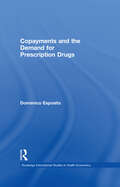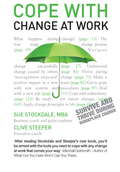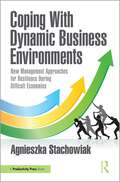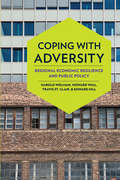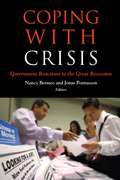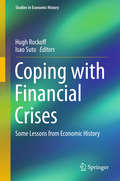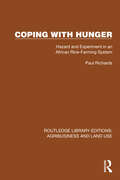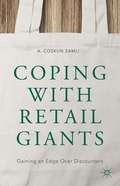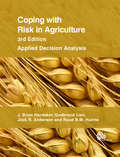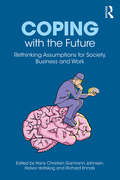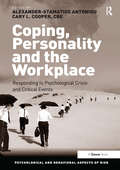- Table View
- List View
Coordination in Large-Scale Agile Software Development: Integrating Conditions and Configurations in Multiteam Systems (Progress in IS)
by Alexander ScheererThis book explores coordination within and between teams in the context of large-scale agile software development, providing readers a deeper understanding of how coordinated action between teams is achieved in multiteam systems. An exploratory multiple case study with five multiteam systems and a total of 66 interviewees from development teams at SAP SE is presented and analyzed. In addition, the book explores stereotypes of coordination in large-scale agile settings and shares new perspectives on integrating conditions for coordination. No previous study has researched this topic with a similar data set, consisting of insights from professional software development teams. As such, the book will be of interest to all researchers and practitioners whose work involves software product development across several teams.
Coordination, Cooperation, and Control: The Evolution of Economic and Political Power
by Randall G. HolcombeThere are two ways people coordinate their actions: through cooperation, exercised by economic power, and through control, exercised by political power. When economic and political power are held by the same people, the result is stagnation; when those who hold economic power are not the same people who hold political power, the result is progress. This book presents the ways in which economic power and political power can be separated, and how they can remain so, by analyzing the nature of power and the differences between economic and political power. The book then discusses the history of economic and political power, including hunter-gatherer societies, agrarian societies, and modern commercial and industrial societies. This background lends insight into why political and economic power were typically held by the same people, and why recently those without political power have been able to acquire economic power. Incentives play a key role in understanding how those two types of power can become separated, and why there is always a tendency for them to recombine. But ideas also play a crucial role, including the influence of the Enlightenment, on the progress that has occurred in the last several hundred years.
Coordination: Keeping Track of Who Owes What to Whom--Commitment Management in Adaptive Organizations
by Stephan H. HaeckelOnce leaders establish an adaptive organizational design, they must propagate and enforce it. Because the design may change frequently as the organization adapts, rapid and systematic dissemination of information about change is vital. This chapter describes a technology-based governance system that supports the creation and tracking of commitments among organizational capabilities, commitments to produce the outcomes required by high-level business design.
Cop's Life: True Stories From Behind The Badge
by Randy Sutton Cassie WellsA COP'S LIFE... is about a midnight call that brings you to a grandmother battered to death in her bed while three punks go running and laughing through the night.... <P> A COP'S LIFE... is about the man in the Ninja outfit who absorbs a full magazine of hollowpoint bullets and still raises his gun to kill you...<P> A COP'S LIFE... is about the honor student, the pride and hope of his family, hanging from a speaker wire, or the baby who dies in your arms, or the people who think you're a hero--or the devil...<P> In this powerful collection of tales from the frontlines, Las Vegas police sergeant Randy Sutton goes beyond the neon into the dark corners of society, putting us into the driver's seat of his cruiser and a job that ricochets from moments of sheer terror to coffee-fueled boredom--with stops on the way at every conceivable act of human folly and depravity. With a poet's touch, and the unflinching realism of a crime scene photograph, A COP'S LIFE is the ultimate depiction of the hardest job there is.
Copayments and the Demand for Prescription Drugs (Routledge International Studies in Health Economics)
by Domenico EspositoIncreasing prescription drug cost-sharing by patients - in the form of increasing copayments - is one of the most striking, and controversial, developments in the health sector over recent years. The exact nature and use of copayments by health care insurers continues to be hot topic of debate. This detailed and meticulously researched study is one of the first of its kind: its results suggest that differences in copayments influence choice, shifting market share for these drugs. Differential copayments for medically equivalent alternatives is one strategy insurers use to affect the choice of one drug over another when faced with differing prices. Relative copayments for therapeutically equivalent drugs, imposed by insurers, are shown to have a significant impact on consumer choice – the implication being that physicians are acting in patients’ financial, as well as medical interest. Unlike much work in this area, Copayments and the Demand for Prescription Drugs is not sponsored by any drug company; and its up-to-date results, established on a firm scientific basis, are entirely unbiased. Its results have applications for the private insurance and pharmaceutical sectors as well as the public sector, and it will be of great interest to professionals and researchers in the fields of health economics, economic and healthcare policy-making, and microeconomics: its primary findings are especially critical to the United States public health sector which is on the cusp of providing a prescription drug benefit to nearly forty million elderly Americans.
Cope with Change at Work: A practical, positive companion for dealing with organisational change
by Sue StockdaleIn these turbulent economic times it seems that change is now, ironically, the only constant. If you have found that your job has changed (or been lost) in ways that you cannot control, then this is the book for you. Whether it's your manager, your job, your employment status, your working style, or your industry that's changing, this book is full of practical tips. And it's not written just for managers either - this book is written for people who are going through change, rather than those who are trying to implement it.
Cope with Change at Work: Teach Yourself Ebook Epub
by Clive Steeper Sue StockdaleIn these turbulent economic times it seems that change is now, ironically, the only constant. If you have found that your job has changed (or been lost) in ways that you cannot control, then this is the book for you. Whether it's your manager, your job, your employment status, your working style, or your industry that's changing, this book is full of practical tips. And it's not written just for managers either - this book is written for people who are going through change, rather than those who are trying to implement it.
Copies in Seconds
by David OwenA lone inventor and the story of how one of the most revolutionary inventions of the twentieth century almost didn't happen. Introduced in 1960, the first plain-paper office copier is unusual among major high-technology inventions in that its central process was conceived by a single person. Chester Carlson grew up in unspeakable poverty, worked his way through junior college and the California Institute of Technology, and made his discovery in solitude in the depths of the Great Depression. He offered his big idea to two dozen major corporations -- among them IBM, RCA, and General Electric -- all of which turned him down. So persistent was this failure of capitalistic vision that by the time the Xerox 914 was manufactured, by an obscure photographic-supply company in Rochester, New York, Carlson's original patent had expired. Xerography was so unusual and nonintuitive that it conceivably could have been overlooked entirely. Scientists who visited the drafty warehouses where the first machines were built sometimes doubted that Carlson's invention was even theoretically feasible. Building the first plain-paper office copier -- with parts scrounged from junkyards, cleaning brushes made of hand-sewn rabbit fur, and a built-in fire extinguisher -- required the persistence, courage, and imagination of an extraordinary group of physicists, engineers, and corporate executives whose story has never before been fully told. Copies in Seconds is a tale of corporate innovation and risk-taking at its very best.
Copies in Seconds
by David OwenThe first plain-paper office copier -- which was introduced in 1960 and has been called the most successful product ever marketed in America -- is unusual among major high-technology inventions in that its central process was conceived by a single person. David Owen's fascinating narrative tells the story of the machine nobody thought we needed but now we can't live without.Chester Carlson grew up in unspeakable poverty, worked his way through junior college and the California Institute of Technology, and made his discovery in solitude in the depths of the Great Depression. He offered his big idea to two dozen major corporations -- among them IBM, RCA, and General Electric -- all of which turned him down. So persistent was this failure of capitalist vision that by the time the Xerox 914 was manufactured by an obscure photographic-supply company in Rochester, New York, Carlson's original patent had expired. Xerography was so unusual and nonintuitive that it conceivably could have been overlooked entirely. Scientists who visited the drafty warehouses where the first machines were built sometimes doubted that Carlson's invention was even theoretically feasible.Drawing on interviews, Xerox company archives, and the private papers of the Carlson family, David Owen has woven together a fascinating and instructive story about persistence, courage, and technological innovation -- a story that has never before been fully told.
Coping With Crisis: A Counselor's Guide to the Restabilization Process
by Jim BurtlesIn the wake of a catastrophic event, the witness may discover or experience unsettling emotions which can trigger subsequent behaviors. These reactions can lead to a number of consequences, some of which are unproductive.
Coping With Dynamic Business Environments: New Management Approaches for Resilience During Difficult Economies
by Agnieszka StachowiakThis book discusses the existing management approaches for dealing with changes, namely readiness, maturity, and resilience. Although these concepts have been discussed for several years now, their importance grows when companies must deal with extended changes in economies. The changes are of a different nature: social, technological, and political, and they strongly impact every aspect of economies and companies’ activity. Is it possible to be ready for the changes? Should companies be resilient to disruption? These are the questions the managers are trying to answer, yet they need some support from academics. This book explores the synergy between the state-of-the-art knowledge and experience of companies to create a Contemporary Management Model. The scope of this book covers the methodology with an introduction and discussion of the key ideas and concludes with a presentation of the Contemporary Management Model followed by the practical validation and verification of the model based on case studies. This book is simply about developing the readiness and resilience of resources and processes, especially from a tactical perspective.
Coping with Adversity: Regional Economic Resilience and Public Policy
by Howard Wial Harold Wolman Travis St. Clair Edward HillCoping with Adversity addresses the question of why some metropolitan-area regional economies are resilient in the face of economic shocks and chronic distress while others are not. It is particularly concerned with what public policies make a difference in whether a region is resilient. The authors employ a wide range of techniques to examine the experience of all metropolitan area economies from 1978–2014. They then look closely at six American metropolitan areas to determine what strategies were employed, which of these contributed to regional economic resilience, and which did not. Charlotte, North Carolina, Seattle, Washington, and Grand Forks, North Dakota, are cases of economic resilience, while Cleveland, Ohio, Hartford, Connecticut, and Detroit, Michigan, are cases of economic nonresilience. The six case studies include hard data on employment, production, and demographics, as well as material on public policies and actions. The authors conclude that there is little that can done in the short term to counter economic shocks; most regions simply rebound naturally after a relatively short period of time. However, they do find that many regions have successfully emerged from periods of prolonged economic distress and that there are policies that can be applied to help them do so. Coping with Adversity will be important reading for all those concerned with local and regional economic development, including public officials, urban planners, and economic developers.
Coping with Crisis
by Jonas Pontusson Nancy BermeoThe financial crisis that erupted on Wall Street in 2008 quickly cascaded throughout much of the advanced industrial world. Facing the specter of another Great Depression, policymakers across the globe responded in sharply different ways to avert an economic collapse. Why did the response to the crisis—and its impact on individual countries—vary so greatly among interdependent economies? How did political factors like public opinion and domestic interest groups shape policymaking in this moment of economic distress? Coping with Crisis offers a rigorous analysis of the choices societies made as a devastating global economic crisis unfolded. With an ambitiously broad range of inquiry, Coping with Crisis examines the interaction between international and domestic politics to shed new light on the inner workings of democratic politics. The volume opens with an engaging overview of the global crisis and the role played by international bodies like the G-20 and the WTO. In his survey of international initiatives in response to the recession, Eric Helleiner emphasizes the limits of multilateral crisis management, finding that domestic pressures were more important in reorienting fiscal policy. He also argues that unilateral decisions by national governments to hold large dollar reserves played the key role in preventing a dollar crisis, which would have considerably worsened the downturn. David R. Cameron discusses the fiscal responses of the European Union and its member states. He suggests that a profound coordination problem involving fiscal and economic policy impeded the E.U.'s ability to respond in a timely and effective manner. The volume also features several case studies and country comparisons. Nolan McCarty assesses the performance of the American political system during the crisis. He argues that the downturn did little to dampen elite polarization in the U.S.; divisions within the Democratic Party—as well as the influence of the financial sector—narrowed the range of policy options available to fight the crisis. Ben W. Ansell examines how fluctuations in housing prices in 30 developed countries affected the policy preferences of both citizens and political parties. His evidence shows that as housing prices increased, homeowners expressed preferences for both lower taxes and a smaller safety net. As more citizens supplement their day-to-day income with assets like stocks and housing, Ansell's research reveals a potentially significant trend in the formation of public opinion. Five years on, the prospects for a prolonged slump in economic activity remain high, and the policy choices going forward are contentious. But the policy changes made between 2007 and 2010 will likely constrain any new initiatives in the future. Coping with Crisis offers unmatched analysis of the decisions made in the developed world during this critical period. It is an essential read for scholars of comparative politics and anyone interested in a comprehensive account of the new international politics of austerity.
Coping with Financial Crises: Some Lessons from Economic History (Studies in Economic History)
by Hugh Rockoff Isao SutoThis edited volume is based on original essays first presented at the World Economic History Conference, Kyoto, Japan, in August 2015. It also includes three essays subsequently written especially for this volume. All of the essays focus on financial markets in the periods leading up to, during, and after financial crises, and all are based on new data and archival research. The essays in this volume enlarge the range of historical evidence on the causes and potential cures for financial crises. While not neglecting the United States or Britain, the usual focus of financial historians, it includes studies of financial markets in times of crisis in Japan, Sweden, France, and other countries to achieve a truly global and historical perspective. As a result of the research reported here the reader will be made aware of several neglected factors that have shaped financial crises including the most recent crisis. These factors are (1) the role played by monetary policy in causing and ameliorating crises, (2) the role played by international contagion in private financial markets in propagating financial crises, (3) the role played by variations in the institutional structures of financial markets in determining the impact of financial crises, and (4) the role played by the social background of the central bankers who must contend with financial crises in determining the final outcome.
Coping with Hunger: Hazard and Experiment in an African Rice-Farming System (Routledge Library Editions: Agribusiness and Land Use #22)
by Paul RichardsOriginally published in 1986, Coping with Hunger demonstrates that effective agricultural development in resource-poor regions must be based in a respect for the indigenous farmer’s understanding of the environment. Based on participant-observation of rice farming in Sierra Leone, the book challenges the prevailing of attitudes of policy makers in the late 20th Century and restores indigenous culture and local wisdom to their rightful place. After analysing the fate of a number of ‘top-down ‘attempts to improve rice cultivation in Sierra-Leone the author derives an alternative agenda of research and development issues more closely reflecting the resource-poor farmers’ major interests and priorities. As a significant research-based contribution to the widespread general debates about the relevance of social factors in technological change, this book will be of interest to students in social and environmental sciences.
Coping with Retail Giants
by A. Coskun SamliIn the retail jungle dominated by giants like Walmart and Costco, survival for small and medium sized retailers will require a major shift from the traditional strategy of merchandise management to focus on generating customer value. Coping with Retail Giants critically analyzes the modern retail market and identifies how businesses gain the competitive edge over the major retailers that currently control the market. Samli argues that as society advances economically, consumers will seek better values generated by the retailing sector. This powerful stimulus will accelerate the retail revolution and be primarily carried out by entrepreneurial retailers-managers in small and medium sized retailing. Samli blends retail theory and practice to present a new model for retailing that delivers customer value, and ultimately, retail success.
Coping with Risk in Agriculture: Applied Decision Analysis
by J Brian Hardaker Ruud B Huirne Gudbrand Lien Jock R AndersonRisk and uncertainty are inescapable factors in agriculture which require careful management. Farmers face production risks from the weather, crop and livestock performance, and pests and diseases, as well as institutional, personal and business risks. This revised third edition of the popular textbook includes updated chapters on theory and methods and contains a new chapter discussing the state-contingent approach to the analysis of production and the use of copulas to better model stochastic dependency. Aiming to introduce agricultural decision making, probability and risk preference, this book is an indispensable guide for students and researchers of agriculture and agribusiness management.
Coping with Unplanned Absences
by Sarah CookWhen your organisation can no longer meet its deadlines, or provide customers with the high quality of service they expect, you have a problem. Unplanned absence also has a bad effect on morale, putting the rest of the team under pressure as they struggle to deal with the additional workload. Unplanned absence can occur as a result of force majeure (for example, when an airline is hit by strike action), or because of poor employee motivation and commitment. This pocket guide, based on best practice guidelines, looks at what you can do to ensure your employees fulfil their obligations and turn up as required. It then gets to grips with the question of how your organisation should handle unplanned absences before and when they arise. While you may not be able to prevent unplanned absence altogether, the advice contained in this guide will help you to keep the extra costs and disruption associated with unplanned absence to a minimum.
Coping with the Fast Track Blues: A Survival Guide for Your Climb to the Top
by Robert M. BramsonCoping methods that can help you deal with the personal and organizational barriers that frequent derail your climb, broad strategies for regaining a better balance between home and work, and more.
Coping with the Future: Rethinking Assumptions for Society, Business and Work
by Richard Ennals Halvor Holtskog Hans Christian Garmann JohnsenCoping with the Future has been written in response to widespread international awareness that the future is not predictable. In political and economic terms, we are in unknown territory, with daily developments around Brexit and the Trump Presidency, and "Kodak moments" in business. On the other hand, business leaders demand certainty, which is not available. This book redefines the nature of modern business. In contrast to recent trends, it has a focus on human-centred manufacturing and on decision-making which goes beyond a focus on short-term profit. The liberal capitalism of the USA and the UK is not the only current variety of capitalism. Business is not just about managers, but requires participation and engagement by workers. Since the financial crash of 2008, there has been much talk about the need for fresh approaches to business, but little has changed. This book pulls together current research and practice and poses new questions based on case studies. There is no one simple best way, but an uncertain future can be addressed, drawing on diverse past experience and cases. The book addresses an intended audience in business and universities, including business schools, around the world. The debate takes a broader approach, involving research in the social sciences and approaches from philosophy. The world has always been unpredictable, but we have allowed ourselves to be comforted by convenient myths. It is time to wake up.
Coping with the Global Financial Crisis: Challenges Facing Low-Income Countries
by Stefania FabrizioThis forthcoming title in the Departmental Paper Series describes the special challenges facing low-income countries as economic growth contracts by an estimated 1. 1 percent globally. Coping with the Crisis: Challenges Facing Low-Income Countries provides an assessment of the implications of the financial crisis for low-income countries, evaluates the short-term macroeconomic outlook for these countries, and discusses the policy challenges they face. Chapters cover the outlook for global economic growth and commodity prices, An overview of how low-income countries have been affected, fiscal policy, monetary and exchange rate policy responses, potential external financing needs and how the international community, including the IMF, can help countries meet them. The challenges ahead for low-income countries are delineated, including debt vulnerabilities and the need for countries to develop well-regulated local capital markets and banking systems, As well as enhanced public sector efficiency.
Coping with the Pandemic in Fragile Cities (SpringerBriefs in Applied Sciences and Technology)
by Gabriele PasquiThis book explores the effects of covid-19 crisis on cities and urban areas and proposes approaches and solutions to invert the pandemic's negative impact. The covid-19 crisis has had significant impacts on public health, on the everyday lives of millions of people, and on the use of urban spaces at all levels. All over the world, cities have been at the forefront of a crisis that have worsened socio-spatial inequalities between regions and inside urban areas. The book examines three aspects of the connection between pandemic and urban issues: the relevance of spatial and territorial variables in the explanation of pandemic dynamics and consequences in fragile cities; the assumption of radical uncertainty as the conceptual framework for a new approach to urban planning, in a phase of raise of public investments; and the design of urban policies aimed at facing the material and symbolic effects of pandemic on the practices of use of spaces and places, in a context characterized by a plurality of populations and forms of life.
Coping with the Stresses and Emotions: Becoming a New Manager Isn't Easy
by Linda A. HillBy necessity, new managers must work hard on themselves as they adapt to the challenges of managerial work and their new network of relationships. The move to management requires numerous changes: in the way you present yourself, in the way others treat you, and in the way you interact with new sets of people. Stress and other turbulent emotions are inevitable, and learning to deal with stresses and emotions may be as important to your career's success as your specific achievements at work. Author Linda A. Hill followed nineteen new managers through their first year, gathering data about the managerial transition. In this chapter, the managers describe in their own words some of the stresses and intense emotions they experienced during their transitions, as well as the mechanisms they developed for coping with stress-related problems in the workplace and in their lives outside of work. This chapter was originally published as Chapter 7 of "Becoming a Manager: How New Managers Master the Challenges of Leadership."
Coping, Personality and the Workplace: Responding to Psychological Crisis and Critical Events (Psychological and Behavioural Aspects of Risk)
by Cary L. Cooper Alexander-Stamatios AntoniouHow an individual responds to crises and critical incidents at work, both immediately and subsequent to the event, is heavily influenced both by personality characteristics and their use of coping strategies. These can, in turn, be affected by levels of education, gender and even the profession within which the individual is working. Coping, Personality and the Workplace offers theory, research and practice on our ability to cope with dangerous situations, critical incidents or other work crises. The chapters include perspectives on social and health habits and risks; gender and age differences as well as a range of different sources of threat: financial, psychological and physical; those within and outside the individual’s control; immediate and chronic. For organizations, this collection provides help and advice to build into employee safety and support programmes; for policy makers, a sense of the emerging sources of risk related to occupational health and for researchers, an anthology of original applied research from some of the leading authors in three continents.
Cops Under Fire: The Reign of Terror Against Hero Cops
by Larry McshaneEvery day, thousands of police officers willingly put their lives in danger to uphold their pledge to protect and serve the public. Once respected for their dedication and professionalism, police officers are now used as scapegoats-the victims of second guessing and racial issues. Allegations of excessive force and police brutality are rampant. Cases involving cops are more political, more scrutinized, and more explosive than ever before. Written in the years following the aftermath of the infamous Rodney King trial, Cops Under Fire is veteran Associated Press writer Larry McShane's probe into a series of high-profile cases involving police officers whose actions in the line of duty led to the questioning of their motives and ruining of their reputations.




